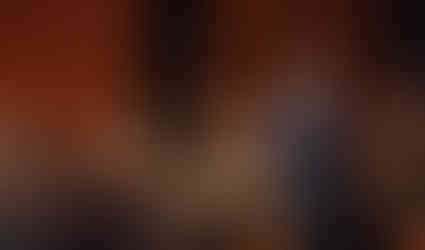Theodora in Concert - Sydney Opera House NSW
- Claira Prider

- Feb 11, 2024
- 4 min read
Composed by George Frederic Handel, Libretto by Thomas Morell
Reviewed by Claira Prider
Pinchgut Opera and Opera Australia
Joan Sutherland Theatre, Sydney Opera House
February 8 & 9, 2024
A musically sensitive, semi-staged production of Handel's achingly beautiful oratorio
Written in 1749, Theodora is George Frederic Handel’s penultimate oratorio. It only had four performances during his lifetime which all received a terrible reception. Prior to this, Handel had moved to London, started three opera companies, had a breakdown, and gone broke. No longer able to afford international virtuosic singers to perform his operas, he needed to find a way to appeal to England's middle class, while still creating the drama fuelled music that he so loved to write. Opera in England was performed mainly in Italian, it covered immoral themes and was expensive to attend. The middle class were mainly of Church of England faith, religious beliefs played a huge role in society and the staging of any sacred story in a church was prohibited – so Handel created English oratorio.
Oratorio refers to a dramatic poem (usually of sacred but not liturgical character) sung by solo voices and chorus and accompanied by full orchestra. It’s usually performed in concert format with the orchestra, choir, and soloists all on stage together throughout, however since Peter Sellars’ 1996 staging of this work at Glyndebourne, the staging of Handel’s oratorio has risen greatly in popularity.
Theodora is a chilling story of two early Christian martyrs who died in Antioch in 304AD. Christian Theodora refused to join Roman rituals and instead of death, was sentenced to serve as a prostitute. Meanwhile Roman soldier Didymus had fallen in love with her and secretly converted to Christianity to be with her. She’d rather be dead than lose her virginity, he’d rather be dead than see her death, so Valens the Roman Governor had them both condemned to death. The lovers’ death isn’t presented as a tragic, sacrificial act of faith, but a powerful force of enlightenment.
Photos by Keith Saunders
Lindy Hume’s realisation saw the Orchestra of Antipodes occupying one side of the stage, with the chorus of Cantillation taking up the back half of the other side, leaving a front quarter empty for the semi staging to take place. Wooden-looking walls facilitated a concert hall feel and lighting on the instrumentalists was warm, drawing particular attention to many of the baroque period instruments.
A chorus is usually there to accentuate and frame the narrative, but Handel wrote them as a pivotal character who highlight the moral viewpoint of others. The twenty strong Cantillation chorus are exquisite, their performance is extremely precise and musically sensitive, and is superbly rounded out by Louis Hurley as Messenger. The chorus alternate between the role of heathen chorus and Christian chorus and apart from the changes in motif and key from Handel, flower crown props and a few Hillsong-esque hand actions with bible holding, it’s not easy to differentiate when the chorus was playing who. Perhaps a less subtle lighting approach could have been utilised to more clearly demonstrate this.
Aussie king of baroque Erin Helyard led the Orchestra of Antipodes as they brought one of Handel’s greatest (self-proclaimed) scores to life. Like Handel, Helyard directed from the keyboard (chamber organ) and I particularly enjoyed how accurately they honoured the score and their era specific stylistic musical interpretation.
More than a quarter of a century on and the story is still shockingly relevant today.
David Greco was captivating and commanding as the tyrannical, unhinged dictator. Balance issues at the start made it hard to hear and appreciate his entrance, but this was short lived, and his performance was rich and so well informed. Michael Petrucelli was delightful as general Septimus, torn between wanting to support his friend Didymus and his allegiance to the Romans. He facilitated a beautiful conversation with the string section in "Though the Honours" and his shining timbre worked so well with the strings. Helen Sherman’s stillness and dark tone in the role of Irene is a perfect juxtaposition to Theodora’s torment.
Christopher Lowrey's Didymus was a breathtaking and generous demonstration of musical mastery. His tone was true and refined, his messa di voce perfect and coloratura easy, giving a very dramatic and enjoyable performance. While there was definitely no weak link amongst the soloists, Samantha Clarke took her character embodiment of Theodora to a whole other level. Her pure, effortless tone and ever so tender and sensitive performance drew so much empathy, she had the entire audience completely engrossed. Lowrey and Clarke’s death duet was profound; I’ve never seen or heard such a cohesive ensemble not just musically but also emotionally, even the final trill in parallel minor thirds was timed in perfect alignment. I really hope that was recorded, it was an honour to witness.
This production was the first time Opera Australia and Pinchgut Opera have collaborated, hopefully marking the beginning of many baroque collaborations. The central theme in Theodora is universal and timeless: intolerance of opposing ideas. Intolerance of those with differing beliefs to us, polarised opinions, and the ultimate power a dictator can have. More than a quarter of a century on and the story is still shockingly relevant today as Pinchgut and Opera Australia presented this exceptional performance in the Joan Sutherland Theatre. I only wish Handel could see how well received and creatively imagined his works are today.
Cast & Creative
CONDUCTOR
Erin Helyard
REALISED BY
Lindy Hume
LIGHTING DESIGNER
Jason Morphett
THEODORA
Samantha Clarke
DIDYMUS
Christopher Lowrey
IRENE
Helen Sherman
SEPTIMIUS
Michael Petruccelli
VALENS
David Greco
Orchestra of the Antipodes
Cantillation
























%20(1).png)
Comments